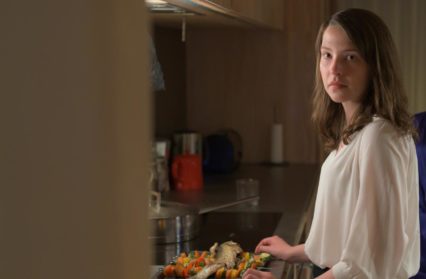Nicola Ryan reviews Gwledd (The Feast) a modern Welsh-language horror set in Snowdonia, which showed at this year’s BFI London Film Festival.
London Film Festival has garnered a reputation for its versatile offerings, presenting a wide range of global films from across a variety of genres. This year’s festival brings a brilliant treat in the form of Gwledd (The Feast), a Welsh-language horror film directed by Lee Haven Jones and based on a script written by Roger Williams. Gwledd follows an affluent family, led by Glenda (Nia Roberts) and her MP husband, Gwyn (Julien Lewis Jones) who have planned a special meal to discuss fracking the nearby farming areas. When a mysterious waitress, Cadi (Annes Elwy), arrives to help them set up, things take a turn for the worse. The film is an eco-horror exploring man’s treatment of the environment and the revenge that the land takes in return.
Gwledd is beautiful to look at. Lee Haven Jones makes use of the natural environment surrounding the family home, frequently contrasting the man-made house with the encompassing landscape. The house looks preternatural in its location set against pervasive and ferocious greenery. Jones’ direction takes the audience on a visual journey as the film slowly descends from shades of bright green into a climactic scene steeped in darkness. It’s hard to believe that the location at the start of the film is the same location by the end. The shift in appearance mirroring the negative implications that fracking has had on the land.
The runtime may only be 93 minutes, but Roger Williams makes sure that no second is wasted. The film throws the audience into the family’s world without pause for context or overwrought exposition, trusting the viewer to connect the dots as the plot develops. The opening scenes are sparse in dialogue, the characters’ personalities are expressed, instead, through their body language and actions. Williams manages to explore an array of themes in Gwledd in a way that feels fully realised by the final act. The central premise revolving around man’s treatment of the environment, and a supernatural exploration of how that land might bite back, with additional analysis of the self and the body. The family sons Guto (Steffan Cennydd) and Gweirydd (Sion Alun Davies) lead polar opposite lifestyles as the former abuses his body through drug and alcohol abuse while the latter loves his body too much and is fixated on his appearance to an unnerving degree. The sons represent two extremes and share no common ground until Cadi arrives.
Annes Elwy’s performance as Cadi is captivating and unsettling in equal measure. From the moment she appears onscreen all the way until the final shot, Elwy commands the audience’s attention without the need for effusive dialogue. Working as a waitress for the family’s meal later in the evening, Cadi spends the majority of the first act observing each member of the family and noting their weaknesses. Her conversation seems knowing and calculating, adding to the eerie atmosphere; her performance seems to fall more into the realm of psychological horror. Elwy’s familiarity with the family and their history is in sharp contrast with the more otherworldly aspects of her character.
Nia Roberts is excellent as Glenda, a woman disconnected from her own roots and community after turning to a life of extravagance as the wife of an MP. Coming back to the newly built family home in Wales presents a stark contrast between the life she once led and the life she leads now, the corruption which has taken place in the time since readily apparent. Even though we don’t see Glenda’s life story take place in the film, we feel Roberts’ disconnection and delusions of grandeur throughout.
What makes Gwledd such a successful film is its ability to merge the personal and the universal; both in its familial roles and timely examinations of fracking and climate change. Although it explores a range of secondary topics, the film never feels overwhelmed or dragged down by the weight of these issues, its sharp script a thread of connection throughout. Overall, Gwledd is a slow burner that is not for the faint of heart. Its plot is tightly wound and its direction unflinching and unapologetic. Despite a limited location and setting, Gwledd manages to pack a punch both on the horror front and thematically with its subject matter, sadly, all too apposite to our current times.
Gwledd (The Feast) is showing at this year’s London Film Festival and has been nominated for the festival’s Sutherland Award. More information on the film is available here.
The Feast












